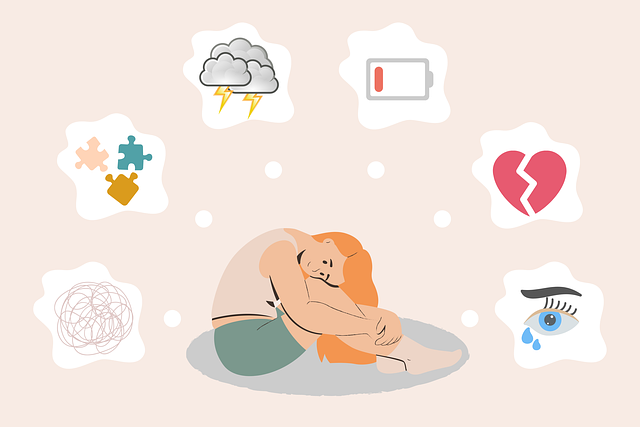Castle Rock Abuse Survivors face unique mental health challenges from trauma. Castle Rock Abuse Survivors Therapy provides a safe space for processing emotions and rebuilding connections. The program emphasizes self-care routines, focusing on essentials like sleep, nutrition and exercise. Mindfulness, journaling and hobbies are gradually introduced to foster resilience and emotional regulation. Cultural sensitivity ensures inclusive support for diverse communities. Consistent practice and adaptability are key to maximizing the benefits of Castle Rock Abuse Survivors Therapy for enhanced well-being.
Castle Rock Abuse Survivors face unique challenges, and prioritizing mental wellness is crucial. This article guides you through developing a self-care routine tailored for your needs. We’ll explore essential steps, from understanding your specific mental health requirements to implementing building blocks that foster resilience. Learn strategies for sustaining and adapting your routine over time, incorporating practices that support Castle Rock Abuse Survivors in therapy and beyond.
- Understanding Your Mental Wellness Needs as a Castle Rock Abuse Survivor
- Building Blocks for a Self-Care Routine
- Sustaining and Adapting Your Routine Over Time
Understanding Your Mental Wellness Needs as a Castle Rock Abuse Survivor

Castle Rock Abuse Survivors often face unique mental wellness challenges due to their traumatic experiences. Understanding one’s specific needs is a crucial step in developing a self-care routine that fosters healing and resilience. Therapy plays a pivotal role in this process, offering a safe space for survivors to process their emotions, navigate complex feelings, and rebuild a sense of safety. Through specialized Castle Rock Abuse Survivors therapy, individuals can learn empathy-building strategies, essential tools to enhance their ability to connect with others and create supportive relationships.
Recognizing the potential for burnout is another critical aspect of self-care. Healthcare providers, in particular, who often support Castle Rock Abuse Survivors, must employ effective stress management techniques. By prioritizing their mental wellness, they can better serve their clients, ensuring long-term resilience and recovery. This involves integrating mindfulness practices, setting healthy boundaries, and adopting sustainable coping mechanisms tailored to individual needs.
Building Blocks for a Self-Care Routine

Building a self-care routine is an essential aspect of mental wellness, especially for those who have experienced trauma or abuse, like many Castle Rock Abuse Survivors Therapy clients. It involves cultivating healthy habits and practices tailored to individual needs. This process starts with identifying basic needs such as adequate sleep, proper nutrition, and regular physical activity, which form the foundation of a balanced routine.
A structured self-care regimen can be designed through gradual implementation, incorporating techniques like mindfulness meditation, journaling, or engaging in hobbies that bring joy. The Community Outreach Program Implementation at Castle Rock recognizes the importance of personal growth and provides resources to help individuals develop coping skills. By prioritizing self-care, one can enhance resilience, improve emotional regulation, and foster a deeper connection with oneself, ultimately contributing to overall mental wellness. Cultural Sensitivity in Mental Healthcare Practice is also integrated into these initiatives to ensure inclusive support for diverse communities.
Sustaining and Adapting Your Routine Over Time

As you establish your mental wellness self-care routine, remember that consistency is key to reaping its benefits over time. Just as Castle Rock Abuse Survivors Therapy focuses on empowering individuals to adapt and thrive after trauma, your self-care journey requires a similar level of resilience and flexibility. What works today might not suit every aspect of your life tomorrow; thus, regular reflection and adjustment are essential.
Periodically evaluate your routine and identify areas that need refinement. Perhaps certain activities once brought you joy but now feel mundane. Or maybe new challenges have emerged that demand different coping strategies. By staying attuned to your changing needs, you can tailor your self-care practice to support ongoing self-esteem improvement and emotional regulation. This dynamic approach ensures that your routine remains a powerful tool for cultivating emotional intelligence and overall mental wellness.
Castle Rock Abuse Survivors can greatly benefit from establishing a dedicated mental wellness self-care routine. By understanding individual needs and incorporating essential practices, such as mindfulness, therapy, and healthy habits, survivors can work towards healing and improved well-being. Sustaining this routine requires adaptability, self-awareness, and the willingness to make adjustments as one’s journey in therapy progresses. Embracing these strategies enables survivors to navigate their path forward, fostering resilience and a deeper sense of self-care.














